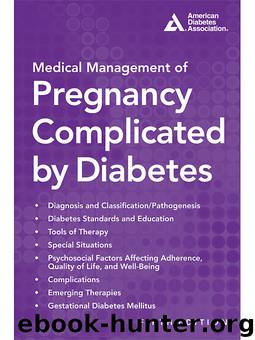Medical Management of Pregnancy Complicated by Diabetes by Donald Coustan Abbot Laptook Carol Homko Susan Biastre

Author:Donald Coustan, Abbot Laptook, Carol Homko, Susan Biastre
Format: epub
Tags: ebook
Publisher: American Diabetes Association (Perseus)
Published: 2013-07-26T16:00:00+00:00
Dietary Fat
Intake of dietary fat provides energy and essential fatty acids, while enhancing absorption of fat-soluble vitamins. There is no RDA for total dietary fat intake. Excess fat intake, however, contributes significantly to energy intake. Fats provide more calories per gram than any other calorie source (9 calories per gram) and excess intake may result in excessive weight gain. This may lead to increased insulin resistance and postpartum weight retention in women with diabetes. It is also important to consider the long-term cardiovascular impact of fat intake in pregnant women with diabetes. Meal plans for women with diabetes generally contain 25–40% of daily calories from fat.
Types of fat include saturated (SFA), transunsaturated, monounsaturated (MUFA), and polyunsaturated fatty acids (PUFA). In the interest of long-term maternal health SFA, found primarily in animal products, should be limited to 7–10% of total calories (Institute of Medicine Food and Nutrition Board 2006, American Diabetes Association 2008a). Trans fat, primarily synthetic, intake should be minimal (Institute of Medicine Food and Nutrition Board 2010). Women with diabetes who have preexisting dyslipidemia should continue to limit their cholesterol intake to <200 mg/day. The remaining 20–30% of daily calories should come from MUFA (e.g., olive oil, avocado, canola oil, almonds) and PUFA (e.g., soybean, corn, and safflower oil).
The adequate intake for essential fatty acids in pregnancy is 13 g/day of omega-6 (n-6) fatty acids and 1.4 g/day of omega-3 (n-3) fatty acids (Institute of Medicine Food and Nutrition Board 2006). The key omega-3 (n-3) fatty acids include eicosapentaenoic acid (EPA) and docosahexaenoic acid (DHA). DHA is a PUFA necessary for fetal central nervous system development. DHA is found mainly in cold-water fatty fish such as salmon. It is recommended that nonpregnant and pregnant women with diabetes eat at least two meals of oily ocean fish per week to reduce the risks of cardiovascular disease (CVD) and hypertriglyceridemia (American Diabetes Association 2008a, 2008b). In pregnancy, women should avoid eating fish potentially high in mercury and polychlorinated biphenyls (PCBs). By limiting consumption to 12 oz per week and avoiding consumption of large predatory fish (e.g., swordfish, king mackerel, shark, and tilefish) pregnant women can incorporate seafood in their diet (U.S. Department of Agriculture, Center for Nutrition Policy and Promotions 2012). Information regarding eating safe seafood can encourage women with diabetes to include healthy seafood choices for their long-term health and that of their developing fetus.
Download
This site does not store any files on its server. We only index and link to content provided by other sites. Please contact the content providers to delete copyright contents if any and email us, we'll remove relevant links or contents immediately.
Name Book, The: Over 10,000 Names--Their Meanings, Origins, and Spiritual Significance by Astoria Dorothy(2979)
Tone Your Tummy Type by Denise Austin(2836)
The Ultimate Guide to Anal Sex for Women by Tristan Taormino(2288)
The Expectant Father by Armin A. Brott & Jennifer Ash(2269)
The Coregasm Workout by Debby Herbenick(2267)
The Women's Health Fitness Fix by Jen Ator(2239)
Expecting Better by Emily Oster(2209)
She-ology by Sherry A. Ross MD(2158)
The Hite Report on Shere Hite by Shere Hite(2061)
Woman: An Intimate Geography by Natalie Angier(1933)
8 Steps to Reverse Your PCOS by Fiona McCulloch(1910)
Birth by Tina Cassidy(1901)
The Female Brain by M.D. Louann Brizendine(1898)
101 Get-Lean Workouts and Strategies by Muscle & Fitness(1854)
Women & the Weight Loss Tamasha by Diwekar Rujuta(1797)
50 Ways to Soothe Yourself Without Food by Susan Albers(1786)
The Big Booty Blueprint: Your Guide To A Bigger Butt In Less Than 12 Weeks by Bella Rahbek & Brandon Carter(1670)
The overachievers by Robbins Alexandra(1576)
Unleash the Power of the Female Brain: Supercharging Yours for Better Health, Energy, Mood, Focus, and Sex by Daniel G. Amen M.D(1569)
